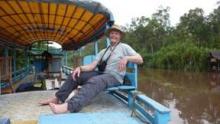Rheumatologic training provides a preparation for any physician who is interested in providing medical care in developing countries, according to Dr. Daniel Albert, who has been globetrotting on medical missions for decades, most recently in Borneo. "Rheumatologists have a broad training in internal medicine, and are great internists," Dr. Albert said. "Being a rheumatologist is very good background for the kind of work that I did [in Borneo], and a good background for clinic work in developing countries in general," he said.
Dr. Albert’s most recent adventure was a monthlong medical trip to Borneo in January 2012, via Health in Harmony, a nonprofit global health organization with an environmental slant. Health in Harmony is funded by individual donations and grants from a range of sources, including the Bill & Melinda Gates Foundation and the National Institutes of Health.
Rheumatologists are well suited to clinic work in developing countries because they are trained to pursue patients’ problems in an analytic fashion that comes down to pattern recognition in a way. Rheumatologists deal with many abstract concepts, Dr. Albert noted. They are always forced to clarify: What are the objective features of the disease, and how do they relate to a possible diagnosis that you are considering?
"Working in a setting where medical resources are limited takes some flexibility in your approach to differential diagnosis, because you don’t have the facilities available that you do in developed countries. Serologic evaluation is nonexistent in most developing countries, so you are much more reliant on the physical exam and history skills," said Dr. Albert, who is a rheumatologist at the Audrey and Theodor Geisel School of Medicine at Dartmouth, Hanover, N.H.
No matter where rheumatologists practice, be it somewhere with high-tech equipment or in a rain forest, "we constantly have to sort through very vague complaints, and we have to do it by the use of our clinical skills," he said. "I think rheumatologists are in a particularly good analytic position to address many of the problems."
Before he set out for Borneo, Dr. Albert said that he prepared in the same way any attending physician would in the United States. "Before going overseas, I think it is useful to do some background homework about diseases that might be more prevalent where you’re going than in America. For example, you certainly want to know about tuberculosis, because that is a worldwide problem that we don’t see much in the United States. In tropical areas, one must recognize malaria and also dengue fever," he said.
Once he was in Borneo, Dr. Albert said that he served as a resource of knowledge and expertise in a teaching mode for the Indonesian doctors, as well as for students and medical residents from the United States (Dartmouth, Yale, and Stanford universities) who were at the clinic. The Indonesian doctors often shared insights with the visiting physicians from their experiences, because they see a different spectrum of diseases than do U.S. physicians.


